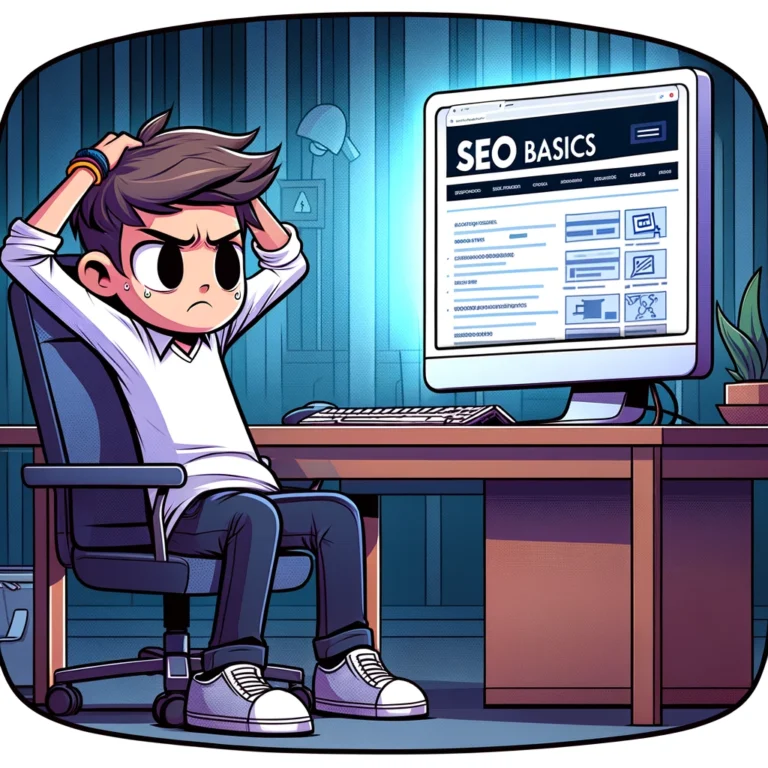Understanding the Importance of a Long-Term SEO Strategy
Search Engine Optimization (SEO) is not a one-off task that businesses can check off their list after implementation. It is an ongoing process, necessary for improving a website’s visibility and achieving long-term success in search engine rankings. When implemented correctly, SEO enhances the user experience and increases organic traffic, which can lead to higher conversion rates and improved brand loyalty. To fully reap the benefits of SEO, it is crucial to develop an annual SEO plan that allows for continuous assessment, adjustment, and optimization.
Setting Your SEO Goals
Before diving into the tactics and tools, the first step in crafting an annual SEO plan is to set clear, achievable goals. What does your business want to accomplish in the next year with SEO? Are you looking to increase organic traffic by a certain percentage, boost conversions, enhance brand visibility, or dominate certain keywords? Setting specific goals helps in focusing your efforts and measuring your success throughout the year.
Align Goals with Business Objectives
Ensure that your SEO goals align with your overall business objectives. For instance, if one of the broader business goals is to enter new markets, your SEO strategy could focus on optimizing content for the geographic locations and demographics of those new markets.
Conducting a Thorough SEO Audit
Starting the year with a comprehensive SEO audit provides a benchmark of your website’s current state and identifies areas that need improvement. An audit covers various aspects of your website, such as:
On-Page SEO
Evaluate how well your content is optimized for your target keywords. Check your titles, headings, meta descriptions, and the overall content structure. Ensure that every element aligns with best practices for on-page SEO.
Technical SEO
Analyze the technical aspects of your website that impact its performance in search engines. This includes site speed, mobile-friendliness, indexability, crawl errors, SSL certificates, and structured data implementation.
Off-Page SEO
Assess your site’s external factors such as backlinks and online authority. Quality and relevance of backlinks can significantly affect your site’s trustworthiness and ranking in search engine results pages (SERPs).
Planning Your SEO Budget
Having a dedicated SEO budget is crucial for implementing the strategies you’ve laid out. Your budget should take into account the costs for tools and platforms, content creation, outsourcing specialized tasks (like technical audits or link building), and potentially training for your team to upskill in latest SEO practices.
Defining Your Target Audience and Keywords
Understanding who your audience is and what they are searching for is crucial for successful SEO. Conduct market research and use tools like Google Analytics to gather data about your current visitors. Such insights help refine your target personas and tailor your content to meet their needs and search habits.
Ongoing Keyword Research
Keyword research isn’t a one-time task—it’s an ongoing activity throughout your SEO plan. Markets evolve and consumer behaviors change, which can shift the popularity or relevance of certain keywords. Regularly updating your keyword strategy to reflect these changes ensures that your website remains competitive and relevant.
Crafting and Implementing Content Strategies
With your goals outlined, budget set, and keywords identified, it’s time to plan the content. A robust content strategy is the backbone of effective SEO.
Content Diversity
Plan for a mix of content types, including blog posts, long-form articles, videos, infographics, and podcasts. Different content types appeal to different segments of your audience and can cater to various user intent.
Content Calendar
Develop a content calendar that schedules all content activities throughout the year. This should not only include publishing dates but also the periods for content research, creation, proofreading, and optimization.
Monitoring and Adjusting Your Strategies
Since SEO is continuously evolving with search engine algorithms, it is essential to monitor your strategies and make adjustments as necessary. Utilize tools such as Google Analytics, Google Search Console, and SEO platforms like SEMrush or Ahrefs to track your website’s performance and uncover insights that can guide your optimization efforts.
Analyze and Iterate
Regular analysis allows you to see what’s working and where adjustments are needed. Perhaps some content types perform better than others, or certain keywords are not bringing in the desired traffic. Based on these insights, tweak your strategies to enhance effectiveness and meet your SEO goals.In conclusion, a well-thought-out annual SEO plan is pivotal for maintaining and improving search engine rankings. It involves thorough planning, execution, monitoring, and continuous optimization to adapt to changes in user behaviors and search engine algorithms. With a proactive approach to SEO, businesses can significantly enhance their online presence, leading to greater organic search success and overall business growth.

Leveraging SEO Tools and Technologies
In the world of SEO, having the right tools at your disposal can dramatically enhance your ability to optimize your site and track your results effectively. Investing in premium SEO tools might seem like a big upfront cost, but the insights and efficiencies they bring can be invaluable over the course of the year.
Choosing the Right SEO Tools
Select tools that align with your strategic goals and integrate seamlessly with your existing technology stack. For example, keyword research tools like Ahrefs or SEMrush offer deep insights into keyword difficulty, search volume, and SERP analysis which are essential for refining your keyword strategy. For technical SEO, tools like Screaming Frog SEO Spider allow you to crawl websites and identify issues like broken links, bad redirects, and page title problems.
Custom SEO Dashboards
Developing customized dashboards through platforms like Google Data Studio can help visualize SEO performance in real-time. These dashboards can pull data from various sources, including Google Analytics and Google Search Console, providing a comprehensive view of your SEO health and helping you make data-driven decisions.
Iterative Content Optimization
While annual planning is critical, the digital landscape is fast-paced and requires an adaptive approach to content strategy. This means regularly revisiting and revising your content to ensure it remains relevant and effective.
Content Refresh and Update
Regularly updating existing content can be just as important as creating new content. This can include updating statistics, adding recent information, or optimizing existing content with new keywords which are gaining traction in your industry.
A/B Testing for Content
Implementing A/B testing on different headlines, calls to action, and page layouts can provide insights into what strategies yield the best user engagement and conversion rates. Understanding what resonates with your audience helps refine your content strategy continuously throughout the year.
Engaging with Emerging SEO Trends
SEO is an ever-evolving field, with search engines constantly updating algorithms to better meet user needs. Staying ahead of these changes by forecasting and adapting to new trends is crucial for maintaining and improving search rankings.
Voice Search Optimization
As devices powered by voice search become increasingly popular, optimizing for voice search queries is becoming essential. This involves focusing on natural language with long-tail keywords and ensuring your content provides clear answers to common questions.
Mobile-First Indexing
With mobile-first indexing now a reality, ensuring that your mobile site is as comprehensive and well-optimized as your desktop site is crucial. This includes making sure it’s responsive, fast, and navigable.Keeping a finger on the pulse of SEO developments not only prepares you for changes but also provides a competitive edge. By adapting quickly to the new norms, such as enhanced emphasis on user experience with Google’s Core Web Vitals update, you can anticipate shifts and adjust your SEO strategies accordingly, ensuring sustained growth and visibility in search results.
Adaptive SEO Strategy Implementation
In the fluid landscape of SEO, it is imperative not only to establish a strong initial strategy but also to remain agile—adjusting and adapting as new data and trends emerge. This continuous iteration isn’t just about staying current; it’s about actively finding opportunities for improvement and leveraging new technologies and methodologies to stay ahead.
Embracing Algorithm Updates
Search engines frequently update their algorithms to provide better user experiences and to prevent manipulative practices from undermining the quality of search results. For SEO specialists, this means constant vigilance is a must. Staying informed through industry news, webinars, and forums can help preemptively adjust strategies that may be impacted by these changes. More importantly, utilizing SEO tools that offer alerts on major algorithm changes can ensure you’re not caught off guard.
Integrating Artificial Intelligence in SEO
The integration of AI and machine learning into SEO strategies can provide a significant advantage in understanding and predicting search behavior. Tools that incorporate AI can analyze large sets of data more efficiently and uncover patterns that might not be immediately obvious. For instance, AI-driven content generation tools can help create uniquely tailored content that meets the specific needs and search behaviors of target audiences, perhaps predicting shifts in interests or seasonal changes more accurately than traditional analytics. These initiatives toward a more dynamic and technologically integrated approach do not just refine SEO practices—they redefine how we understand and interact with digital content. As the tools and technologies evolve, so too must our strategies, ensuring that they are not only responsive to current trends but also proactive in anticipating future developments.
Crafting a Future-Proof SEO Strategy
As the digital world continually evolves, so too must our strategies for search engine optimization. The future of SEO lies not only in adapting to changes but also in anticipating them. Crafting a strategy that is both flexible and forward-thinking is critical to maintaining visibility and relevance in an increasingly competitive digital landscape. The key to a successful, adaptive SEO strategy is understanding that it’s a never-ending process of learning, testing, and refining. SEO is not a set-and-forget element of digital marketing; it’s an ongoing commitment to excellence and innovation. By embracing the iterative nature of SEO, businesses can not only respond to immediate changes in algorithms and user behaviors but also set the stage for long-term success. Investing in robust analytical tools and AI technologies, keeping a pulse on algorithm updates, and continuously generating high-quality, engaging content are indispensable practices for anyone looking to excel in SEO. Each of these elements helps to create a more robust and resilient strategy that can withstand the test of time and technological advancements.
In conclusion, embracing an adaptive SEO strategy is vital for any business aiming to thrive in the digital age. It requires a blend of technological savvy, proactive planning, and continuous learning. By staying informed, being agile, and consistently applying new insights and technologies, businesses can not only keep pace but lead the charge in the dynamic world of search engine optimization. The future favors the flexible, and with a solid adaptive strategy, your SEO efforts can help secure your place at the forefront of your industry.
References:
- Aleyda Solis. (2021). SEO Strategy Framework: How to Craft Yours in 4 Steps. Retrieved from https://www.aleydasolis.com/en/search-engine-optimization/seo-strategy-framework/
- BrightEdge. (2022). The Importance of SEO Planning. Retrieved from https://www.brightedge.com/blog/seo-planning
- Moz. (2023). The Beginner’s Guide to SEO. Retrieved from https://moz.com/beginners-guide-to-seo
- Neil Patel. (2020). How to Plan Your SEO Strategy for 2023. Retrieved from https://neilpatel.com/blog/seo-strategy/
- Search Engine Journal. (2022). Creating an SEO Strategy: What You Need to Know. Retrieved from https://www.searchenginejournal.com/seo-guide/seo-strategy/
- WebFX. (2021). 8 Steps to Building an Effective SEO Strategy. Retrieved from https://www.webfx.com/SEO/how-to-create-an-seo-strategy.html
- Yoast. (2023). Developing an SEO Strategy for the Next Year. Retrieved from https://yoast.com/developing-an-seo-strategy/



